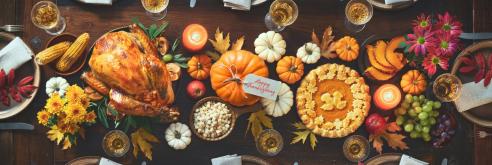Holiday Food Safety Tips
November 22, 2024
The holiday season brings people together to reconnect, celebrate and share festive traditional dishes. These meals can be memorable, and the Portsmouth Health Department offers the following food safety tips to help you prepare your meal safely so that your holiday isn’t spent dealing with foodborne illness.
Foodborne pathogens can cause severe and even life-threatening illnesses. Easy-to-do, safe food handling practices protect everyone from getting sick.
- Clean your kitchen surfaces before you start prepping food. Use hot, soapy water to wash countertops and surfaces, cutting boards, refrigerator door handles and utensils. This will help remove dirt, particles, and some bacteria. Next, use a sanitizing spray to kill any bacteria that are still present. There are specific sanitizing sprays that can be used on surfaces that food will touch.
- Wash your hands before, during and after food preparation. Proper handwashing may eliminate a significant percentage of food poisoning cases. Remember to wash hands when switching tasks, such as handling raw meat and then cutting vegetables. Wash hands thoroughly in warm, soapy water for at least 20 seconds.
- Defrost carefully. Never allow food to defrost at room temperature, on the counter or in warm water. Defrost food only in the refrigerator, in the microwave or in a cool water bath with water that is changed every 30 minutes. When defrosting food in the refrigerator, remember to cover raw meat and place it on the bottom shelf so juices will not drip onto other foods. When defrosting food in the microwave, cook it immediately afterward.
- Keep foods separated to prevent food contamination and cross-contamination. Cross-contamination happens when raw foods like chicken, fish, meat, or eggs touch foods that won’t (or don’t need to) be cooked. Keep meat, chicken, turkey, seafood, and eggs separate from all other foods at the grocery store and in the refrigerator. Prevent juices from meat, chicken, turkey, and seafood from dripping or leaking onto other foods by keeping them in containers or sealed plastic bags. Store eggs in their original carton in the main compartment of the refrigerator.
- Use two cutting boards. Dedicate one for raw meat, poultry, and fish and the other for ready-to-eat foods, such as fruits and vegetables. Make it easy to remember by using color-coded cutting boards, one for raw meats and one for ready-to-eat foods.
- Employ different utensils for different tasks. Use separate spoons and forks to taste, stir and serve food. Consider options that make it easy for guests to take food without touching it, such as separate serving utensils for each dish, or toothpicks or tongs.
- Cook food thoroughly. Use a food thermometer to make sure meat, chicken, turkey, seafood, and eggs have been cooked to a safe internal temperature to kill germs. Roasts, chops, steaks, and fresh ham should rest for 3 minutes after you remove them from the oven or grill. (Do not rely on "clear juices" to tell that the turkey is done.)
- Resist temptation when baking. Raw flour and eggs can have harmful bacteria, such as E. coli and Salmonella. Eating uncooked dough and batter made with flour or eggs can lead to food poisoning, this includes dough or batter for cookies, cakes, pies, biscuits, pancakes, tortillas, pizza, or crafts. Some companies and stores offer edible cookie dough made with heat-treated flour and pasteurized eggs or no eggs. Read the label carefully to make sure the dough is meant to be eaten without baking or cooking.
- Refrigerate food within two hours of serving. This helps to prevent the growth of harmful bacteria that can lead to food poisoning. This is especially important when serving buffets. Use a refrigerator thermometer and make sure it is set at below 40°F.
- Store leftovers in shallow containers (2 inches deep or less). Remove turkey from the bone and store it separately from the stuffing and gravy. Slice breast meat; legs and wings may be left whole. Use turkey within 3 to 4 days; stuffing and gravy within 1 to 2 days. Reheat leftovers to 165°F.
- When in doubt, throw it out!
Whether you're bringing a holiday dish to the party or preparing the holiday feast yourself, it's important to practice safe food handling and keep in mind the needs of those who may be vulnerable to food poisoning.
Take special care during the holidays to ensure that vulnerable guests, such as older adults, pregnant women, young children, and people with weakened immune systems avoid high-risk foods, such as raw or under-cooked eggs, raw or unpasteurized dairy products, raw fish, or shellfish, raw or rare meat or under-cooked poultry.
ADDITIONAL RESOURCES
8 Tips for Allergy-Free Holidays
Holiday Food Safety Video (English)
Seguridad de alimentos durante festividades video (Spanish, en español)
Have additional food safety questions? The USDA Meat and Poultry Hotline can personally answer your food safety questions on weekdays year-round. The Hotline is staffed by food safety specialists with backgrounds in home economics, nutrition, and food technology.
USDA Meat and Poultry Hotline toll free at 1-888-MPHotline (1-888-674-6854).
The Hotline is open year-round Monday through Friday from 10 a.m. to 6 p.m. ET (English or Spanish). Recorded food safety messages are available 24 hours a day. Check out the FSIS Web site at www.fsis.usda.gov.
Send email questions to MPHotline@usda.gov.
The Hotline is open on Thanksgiving Day from 8:00 a.m. to 2:00 p. m., Eastern Time, but closed on other Federal government holidays.
